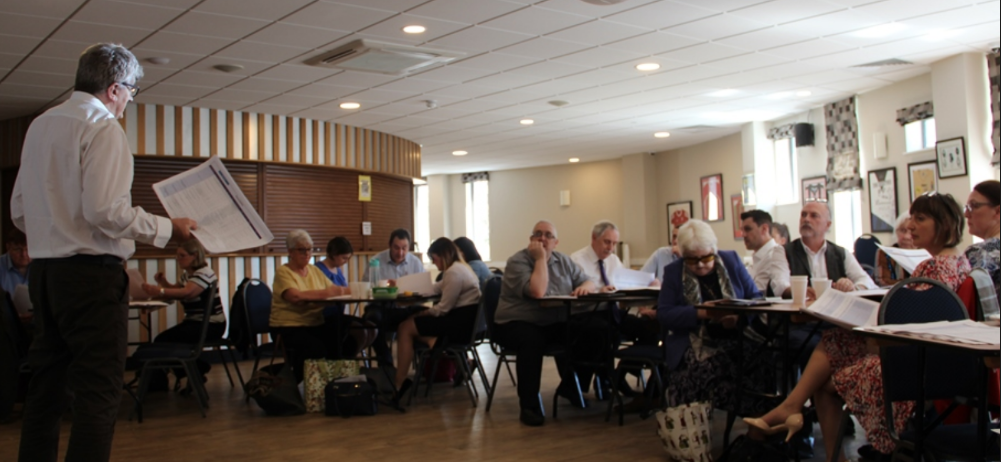Austerity has impacted massively on local government, decimating frontline services across the country, with councils facing more cuts to funding and worsening financial challenges.
Against this bleak backdrop, local authorities are fighting back and increasingly recognising that mutual and co-operative ways of working can help rebuild communities disheartened and demoralised by years of cuts. Preston City Council led the way, supporting a wide range of co-operative enterprises built around the city’s anchor institutions – including the county constabulary, a public sector housing association, colleges and hospitals.
Council leaders also decided to buy goods and services locally to stop 61% of their procurement budget being spent outside of the Lancashire economy. In the process, the town’s fortunes have been turned around and the results are inspiring other local authorities to go back to their roots engaging local communities.
Preston is also a key player in the Co-operative Councils Innovations Network (CCIN), which is offering an alternative approach to delivering services, using co-operative values and principles.
It comprises 23 councils across the UK, from Bassetlaw to Bristol, which have committed themselves to finding better ways of working for and with local people. Members share the belief that working co-operatively with communities holds the key to tackling today’s challenges – replacing traditional models of top-down governance and service delivery with local leadership, built on the founding traditions of the co-operative movement.
Ethical expertise is provided by its Values and Principles Board, which includes representatives from the Co-op Party, Co-operatives UK, the Co-operative College and Co-op Press.
Director of communications Nicola Huckerby says there has been a surge of interest in the last 12 months.
“This year, our annual conference in October attracted a lot more council leaders, MPs, peers and council officers who want to help. Councils need to join to help them identify solutions to the challenges they are facing with ever-reducing budgets.

“More and more councils are coming forward and saying let’s have a conversation – and we are more than twice the size we were at the beginning of 2017 with 16 new affiliates and 10 new associate members. This year we went over to Brussels to meet the president and director general of the ICA and were at the autumn political conferences.”
CCIN has just launched a new round of Policy Lab funding whereby members put forward their ideas for partnership projects they would like to see delivered in 2019/20 with £10,000 going to the lucky recipients.
“Ordinary members are taking back ideas wanting to share with their councils. It resonates very well with co-operative ethics and values. The principle of the network is investing to save and looking at delivering services more effectively and with social value. Whether tackling food poverty, asset transfers or procuring ethically it is about how do you deliver services for the benefit of residents. Different authorities have lessons we can learn so rather than starting a journey on our own we are sharing information.”
The network’s list of co-operatively led projects is a very long one. It includes CATERed, a co-operative trading company jointly owned by 67 local schools and Plymouth City Council, providing high quality school food to children and young people across the city not just in school time but in vacation periods to alleviate holiday hunger and food poverty.
In Rochdale, Parent Carers Voice, an independent group of parents of children with disabilities, is working with council officers to deliver better services.
Their latest project is a new independent living facility for young people with autism.
Spokeswoman Helen Walton said: “There is currently no provision locally for these young people. Many of them live in out of borough placements, far from families, friends and communities and at considerable expense to the local authority. Recognising provision could be provided more appropriately locally, the council, health care trust and parents/carers began to work on a programme to commission the scheme.
“The parents/carers have been actively and equally involved throughout the process, playing an active role in tendering for the scheme. They have worked with the successful tenderers, identifying an appropriate site and working on the design and layout speaking with local residents at consultation events and at planning committees to ensure young peoples’ voices were heard.”
The development, set to open in summer 2019, will be named Pioneer Fields, acknowledging Rochdale’s place in the history of co-operation and the ongoing approach designed to meet young people’s needs. It will provide 15 high-quality bungalows with carer accommodation, communal social space, a café, small farm and horticultural facilities – all purpose-built to meet individual needs.
Knowsley Council and its partners are set to launch a six-month period of engagement with the community, after the council’s cabinet agreed a new approach to planning for the future. The council will work with residents, businesses and partners to help shape what kind of place Knowsley will be in 2030, identifying ways to achieve that vision, focusing on the physical environment but also covering important issues such as educational attainment, job creation and health of the borough’s residents. The new long-term strategy for Knowsley, which will be developed over the next 18 months, will launch in 2020 and run until 2030.
Stevenage Against Domestic Abuse has developed a strategic and co-ordinated approach to tackling and reducing domestic abuse working with internal and external partners, putting the victim and their family at the heart of the project and working co-operatively to involve them in decision making.
The service is believed to the first in the country that encourages organisations to refer victims and their families a Safe Space provided by the council to stay for up to seven nights while they make decisions on their future. It encourages and empowers victims and survivors and has so far supported 85 victims of domestic abuse with input from independent domestic violence advisors, children’s services, the mental health team, health visitors and the police.
The SADA team also includes the Domestic Abuse Forum, a survivors group that informs direction of the service and delivers training to neighbouring local authorities and partner agencies.
Stevenage community safety manager Sarah Pateman said: “We look at it more from the victim’s perspective. We are involving people, empowering them to become survivors and asking them what their preferred option is. By working together in this co-operative way we can help victims, families and our partners to offer a joined-up approach to tackling domestic abuse and helping to keep victims safe.”
New initiatives in Sunderland include REuse – a project working with vulnerable groups and local charities which uses the council’s IT system to recycle old furniture/equipment .
The council also supports Bishopwearmouth Co-operative Nursery, which delivers a wide range of professional horticultural and floristry services to customers across the North East. All profits are invested into the company to provide paid employment, education, training and work-based placements for vulnerable adults with learning or physical disabilities. The co-operative is in the process of opening a café on site in spring next year.
Cabinet secretary Paul Stewart, a Labour /Co-op councillor who is in charge of the council’s finance and corporate services, is enthusiastic about all these initiatives. A founder member of the CCIN, he now serves on its executive and is optimistic about what can be done despite the fact Sunderland alone has lost £290m in central government funding since 2010.

“We are all under a lot of pressure however the network helps us promote our ideas and values as best we can. All our members have a constitution which says we are co-op councils trying to pursue co-op values. Preston Council is a key member of the network and its leadership have been very helpful sharing their experiences.
“Here in Sunderland we are in the process of putting a programme together to implement an ethical procurement system and looking at how we can support local businesses more. In Sunderland 30% of our money is already spent here and two-thirds in northern region. We are looking to expand that further by reducing the size of contracts as the larger the contract the more likely it is to be a national company.”
The council is also setting up a co-operative development fund to help set new up co-ops or expand existing ones.
“It is early days but a resolution is going to council this month which will hopefully give me authority to plan a more formal community wealth building programme helping us further develop our existing co-ops and build support for them .
“In Sunderland low pay affects 25% of the workforce and we want to ensure that local employees are paid a decent Living Wage but it is going to take time because of the financial climate. It is a long-term project – however it is the right thing to do if you genuinely believe as a council you should be ensuring where you have ability to influence other employers. By trying to move things forward we can increase the pace at which we move towards further development of co-operatives. The important thing is to promote the agenda ensuring you are open and honest as a council.”
August this year saw the publication of the Social Housing Green Paper. Almost 1,000 tenants shared their views with ministers at 14 events across the country, with over 7,000 submitting opinions, issues and concerns online as the government aimed to re-balance the relationship between tenants and landlords in the wake of the fire at Grenfell Tower.
One way forward has already been pioneered by Rochdale Boroughwide Housing, the UK’s first tenant and employee co-owned mutual housing society, with over 13,000 homes in its remit. RBH became a mutual in 2013 following a standard stock transfer from the council in 2012. It now has 5490 tenant members and 461 employee members .
Spokesman Iain Lindley says their model is key to engaging tenants and employees and giving them an extra stake in the society and its future.
“I think people feel they have a better influence and they feel a bit closer to the decision making process. You have not got that adversarial situation where it is them and us. Our tenant and employee members elect the people who sit on our representative body which appoints non-executive directors and six of the eight board members.
“We are trying to do things together with tenants and get them involved as much as we can as an integral part of the decision-making process. Our tenants have the opportunity to make decisions and influence things in a way they did not before.”
Unlike other housing associations, RBH is very much about keeping things local, he adds. “We are committed and focused on Rochdale. I do not think we will be an enormous developer like other housing associations. We have just approved our new corporate strategy, our tenant members and employee members are integral to that and have the final sign-off. It has been developed together and not imposed by a management team.
“By working together we provide better places for our members, tenants and employees to live and work. Drawing on the area’s rich co-operative heritage, our pioneering model places members at the heart of decision-making, allowing everyone to enjoy a sense of security and belonging in places we make great together.”
In May 2016 Merthyr Valleys Homes (MVH) became the first in Wales to allow tenants and employees the opportunity to become a member, and own a share in the organisation. First established in 2009, it currently owns and manages over 4,200 homes across the borough.

Outgoing CEO Mike Owen explains the transition: “Our first five years were dedicated to achieving promises made to tenants upon transfer, and also achieving our Welsh Housing Quality Standard targets. In 2014, we started to look at the future of our organisation, and how we wanted the organisation to develop in the coming years. We always listened to and involved our tenants and employees, but our board wanted to take this a step further and opted to develop a new governance model where we could empower our tenants and employees by allowing them to become members, giving them a real say, and playing an important role in decision making. Under the old model, tenants found they could not really be representatives because they had to be company directors and there was no way to go back to constituents and be accountable.
“We decided we really needed to have a re-think of our position when there was a very big issue around the TV show Skint, filmed in Merthyr Tydfil. We sat back and said why have these people gone on TV and trashed their own community and how far are they from any power and responsibility for communities? Maybe we ought to rethink the power relationship.
“We decided to set up a commission with tenant and councillor reps from the community. We started to explore different models and went to mutual pretty quickly. Everyone liked this idea of partnership between tenants and employees. It was then a case of how it would work and operate. The council leader was really supportive and all 33 councillors voted in favour of change. We had a good momentum and moved on from there.”
MVH is now recruiting a new CEO and starting a young members’ group, added Mr Owen.

“The most subtle change has been that the board are not at the top of the pyramid. They see themselves as accountable to the democratic body who appoint them. We had an AGM three weeks ago which was really well attended. Our head office is in the middle of an estate, we have a community zone bringing all providers in together making sure what we do fits our mutual values. We have been braver in our approach to how we deal with stuff like new build. Constitutionally we would only build houses in Merthyr and we would not be taken over without the consent of tenants and employees. The people of Merthyr built these houses and should stay in control.”
Cliff Mills, principal associate at Mutuo, specialises in corporate governance and constitutional advice in the establishment and running of co-op, mutual and membership-based organisations. He agrees the housing model adopted in Rochdale and Merthyr, which he helped to develop, offers real opportunities for better engagement although they are currently the only two examples of tenant and employee based membership. There are other examples in England and Wales with just tenant members.
“Member-owned housing is still not widely recognised as a mainstream approach in social housing, but post-Grenfell this is an approach which deserves to be more widely explored as it puts tenants right at the heart of the organisation.
“Rochdale and Merthyr became mutuals for different reasons. In Rochdale’s case it followed a review of future finances and a desire to increase the involvement of tenants and employees. It is very different from a traditional housing association and operates in a radically different way. Their first corporate strategy as a mutual is a joint piece of work involving tenants, employees, the representative body and the board.
“Both Merthyr and Rochdale are very focussed on their locality, rather than having ambitions to expand. What they are about is improving their local community. Merthyr adopted this approach a few years after RBH, but they are already doing some very significant things differently in their locality, and have a very similar approach to RBH in terms of ownership and governance. What both do is provide a mechanism to enable the housing assets and services to work for the benefit of the local community.
“In this approach, the two groups most affected by the business (those using the service, and those delivering it) are part of the collective endeavour. Instead of being ‘done to’ they are ‘a part of’ and co-own the organisation. In traditional housing associations priorities are normally set by management but at RBH and Merthyr tenants and employees really influence decision-making and so the organisations have different priorities. You are not suddenly going to change the nature of the services overnight but the difference is that tenants and employees can be fully engaged in making them successful. Tensions can be worked out in dialogue between groups.
“It is all about transferring power and you need an executive team who understand that. We are always talking to CEOs and different organisations which might be interested in this approach. It is important to make the concept as widely known as possible, and so that people can see that this model is an effective way of meeting today’s big challenges.”